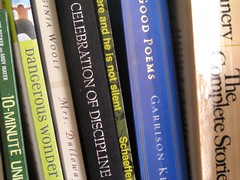 She’s right—
She’s right—
it’s not apathy that flattens my brain
like one of her Frisbees
as it wings through each day,
rebounding from someone else’s hand,
flying on someone else’s throw.
It’s not apathy that has curdled
my craving for sweet knowledge
so that my stomach lurches when I sit down
to parse a Spanish verb,
to examine the starched silt of Victorian England
and write one more paper
to add to the ream I’ve written
in exchange for just one, in calligraphy.
This thing that has stolen sleep from me,
that pins open my eyes to stare at nothing,
that freezes my purpose, my motivation
into a blunt cube of mute apprehension—
no, it’s not apathy.
It’s impossible to not care. No.
Someone has their fingers tangled in my hair,
pulling back my head to stare at the stars.
Something has planted my feet in the mud
and held out my arms to catch all the rain.
Some force of being, some impulse for justice
has interrupted my continuum as it did for Joshua,
has stopped my sun over Gibeon, and is screaming,
“Too many times have your epochs gone unnoticed.
Too many times has your life undergone metamorphosis
in a slow and single moment that you
were traveling too fast to see.
No more will you be carefree,
no more will you skip around your life’s transformation.
Stand, lift up your head,
and watch your being supernova into newness.
Stand, look down at your earth
and watch the quake strip your life of what has been.
Stand. This time, you will watch your butterfly struggle
from faded cocoon to fresh quickening.
The old has gone, the new is coming.
4.27.06
crystal l.
Tell all the Truth but tell it slant
by Emily Dickinson
Tell all the Truth but tell it slant—
Success in Circuit lies
Too bright for our infirm Delight
The Truth’s superb surprise
As Lightning to the Children eased
With explanation kind
The Truth must dazzle gradually
Or every man be blind—

Selecting a Reader
by Ted Kooser
First, I would have her be beautiful,
and walking carefully up on my poetry
at the loneliest moment of an afternoon,
her hair still damp at the neck
from washing it. She should be wearing
a raincoat, an old one, dirty
from not having money enough for the cleaners.
She will take out her glasses, and there
in the bookstore, she will thumb
over my poems, then put the book back
up on its shelf. She will say to herself,
"For that kind of money, I can get
my raincoat cleaned." And she will.
A friend just brought to my attention the fact that I've been "published" on the Academy of American Poets web site. Well okay, not really. It's just a response to a project they're doing for National Poetry Month, in which people send in lines of poems that are very dear to them and explain why. Click here and look under April 8 to see my entry. This is the poem my lines come from:
Famous
by Naomi Nye
The river is famous to the fish.
The loud voice is famous to silence,
which knew it would inherit the earth
before anybody said so.
The cat sleeping on the fence is famous to the birds
watching him from the birdhouse.
The tear is famous, briefly, to the cheek.
The idea you carry close your bosom
is famous to your bosom.
The boot is famous to the earth,
more famous than the dress shoe,
which is famous only to floors.
The bent photograph is famous to the one who carries it
and is not at all famous to the one who is pictured.
I want to be famous to shuffling men
who smile while crossing streets,
sticky children in grocery lines,
famous as the one who smiled back.
I want to be famous in the way a pulley is famous,
or a buttonhole, not because it did anything spectacular,
but because it never forgot what it could do.
My life is plummeting into the abyss of the past faster than I can shake a stick at. I thought I had just posted on this thing, and nay, I find out that it has been four whole days.
Right after Easter, I have my final project in English Senior Seminar due, and I'd like to expand on my theory that this is one of, if not the best time to write and appreciate poetry. I don't know if I can pull it off, but I'll certainly have fun trying, which is what counts when I'm finishing up 19 credit hours, a part-time job, and relationships with dear, dear people I won't see again for a long time.
I think we've come to a great place in poetry--we appreciate multiplicity in form and genre, we've brought about the happy marriage of realism and romanticism, and we rely just enough on sound and rhythm to create lovely poetry, but not so much that we lose readability in the attempt to design a perfect metric scheme. Granted, some of this newer, extremely experimental stuff, as well as the voyeuristic, sexual-politics-ridden refuse I could leave behind without qualm, but fortunately, that kind of poetry seems to be in the minority.
I just convinced our school library to purchase a wealth of new poetry anthologies and collections. Anything to make that sad, but cozy little building more relevant.
One Art
by Elizabeth Bishop
The art of losing isn't hard to master;
so many things seem filled with the intent
to be lost that their loss is no disaster.
Lose something every day. Accept the fluster
of lost door keys, the hour badly spent.
The art of losing isn't hard to master.
Then practice losing farther, losing faster:
places, and names, and where it was you meant
to travel. None of these will bring disaster.
I lost my mother's watch. And look! my last, or
next-to-last, of three loved houses went.
The art of losing isn't hard to master.
I lost two cities, lovely ones. And, vaster,
some realms I owned, two rivers, a continent.
I miss them, but it wasn't a disaster.
--Even losing you (the joking voice, a gesture
I love) I shan't have lied. It's evident
the art of losing's not too hard to master
though it may look like (Write it!) like disaster.

